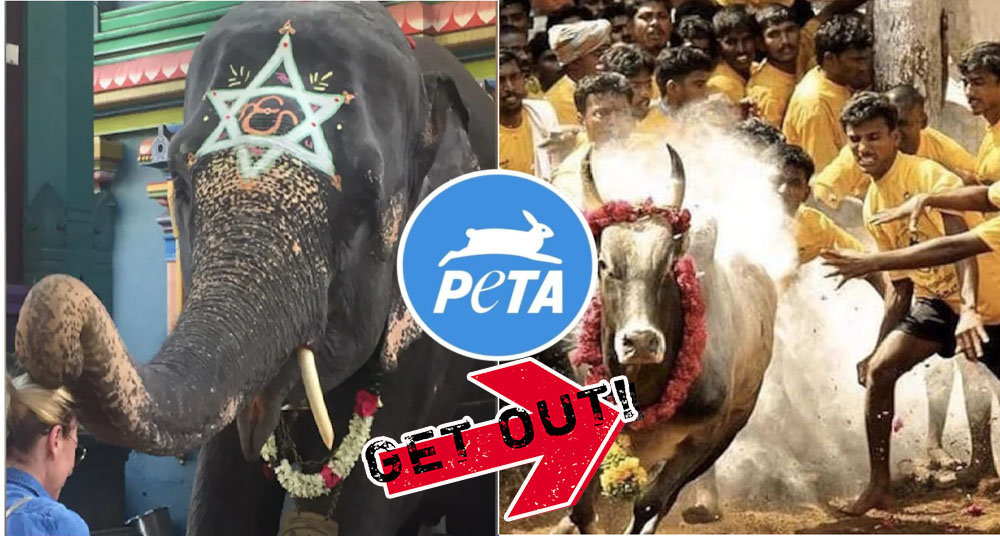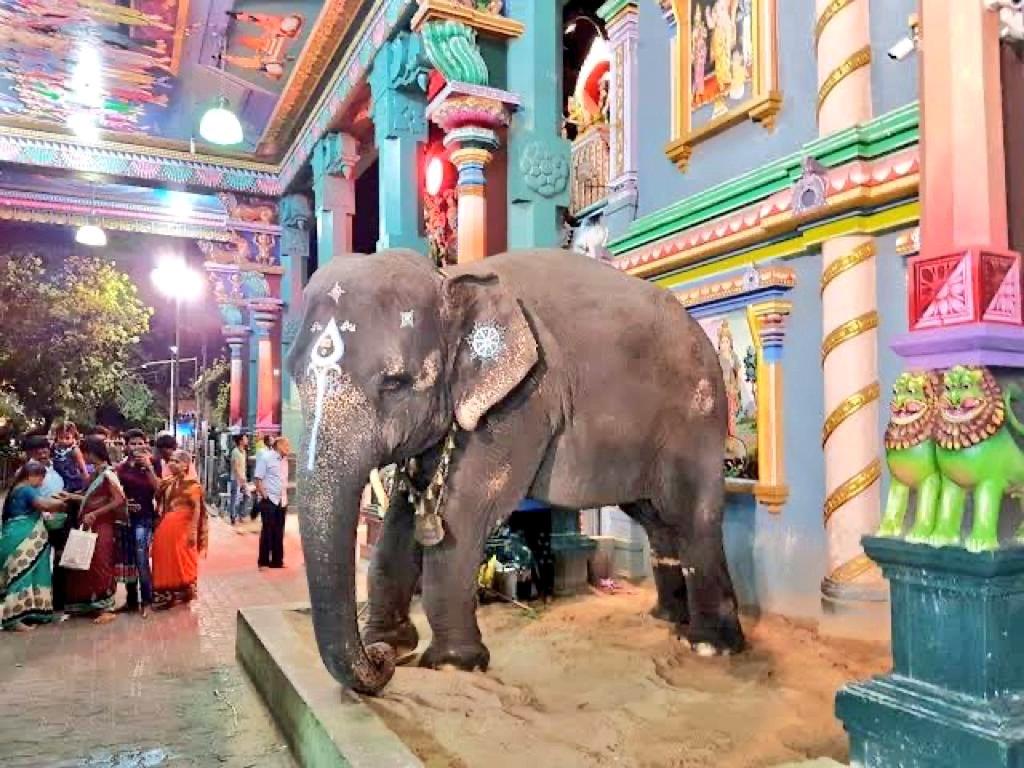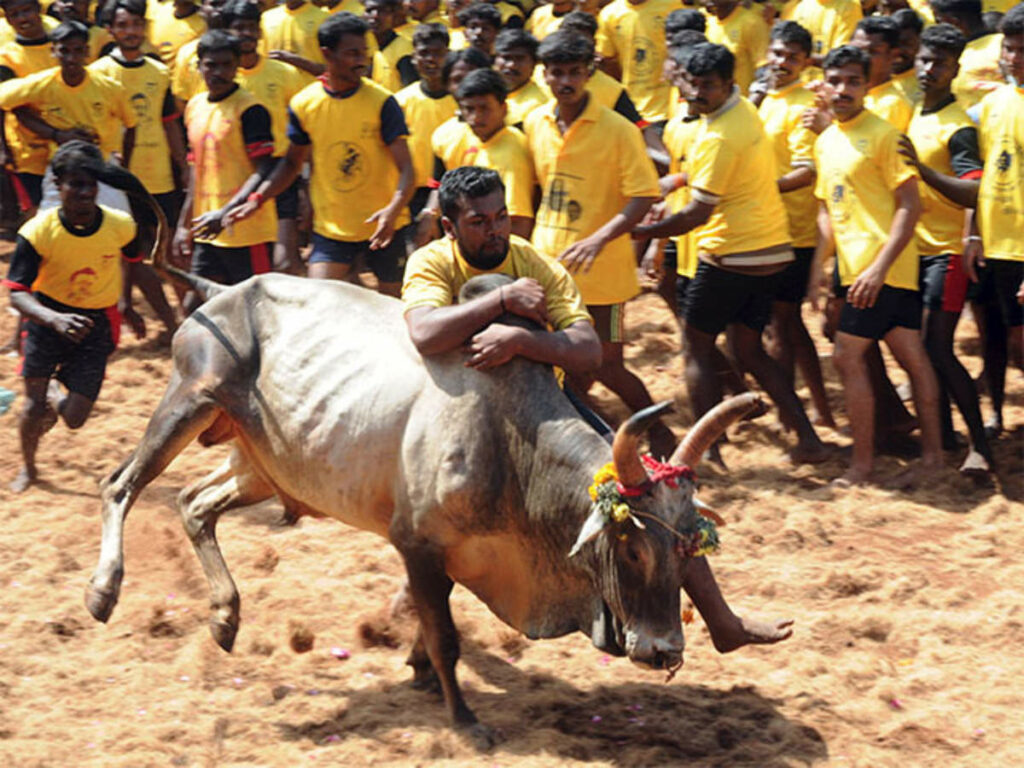
PETA and other Animal Rights bodies are under the scanner, after the demise of “Lakshmi” as Tamil Nadu’s “Jallikattu” case resumes in Supreme Court. Animal Rights, as with human rights is a good, noble cause. It can be a tough balancing act with good intentions on the one hand and stringent implementation/enforcement on the other. An improper balance regardless of the challenge, can tip the scales too much in either direction and end up with unpleasant results and resistance from humans.
Animal Rights activists are correct that certain elements in human society need to be reprimanded for the inhuman, unacceptable treatment of animals. What they need to be careful about is the tendency to cross a certain line, without substantial evidence and practical solutions, into the sensitive areas of traditional human-animal partnerships in society, developed over thousands of years for purposes of livelihood, cultural or spiritual enrichment.
It is often a fine line between what appears to be bordering on animal “cruelty” and the actual circumstances of the human-animal relationship. Frequent cases of misjudgement of the actual conditions by over-enthusiastic animal activists can cause mistrust between an Animal Rights group and the common people.
Of late, this has been the case with organizations like the People for the Ethical Treatment of Animals (PETA) and the Animal Welfare Board of India (AWBI).
PETA’s Tryst With Lakshmi
Amongst the most recent controversies courted by PETA is one surrounding a young elephant, Lakshmi in Puducherry. She was a much-loved temple elephant, who grew up on the temple premises and reportedly enjoyed a close bond with her mahout since she was five years old.
To cut the story short, the AWBI and PETA were involved in having Lakshmi removed from the temple and moved elsewhere, citing her allegedly ‘injured’ feet from a long, stationary standing position, while on temple duty. The temple authorities and her mahout had disagreed with the organization’s analysis but she was taken away by them and returned a month later when it was observed and acknowledged that she was in more physical and emotional distress at her new shelter. In a short while, after the relatively young 32-year-old elephant’s return to the temple, to her mahout companion and her familiar temple routine, she reportedly collapsed from a sudden heart failure while on a walk. The temple claimed Lakshmi’s conditions at the ‘shelter’ she was earlier taken to, including a lack of opportunity to walk, were the reasons for massive water retention in her body and a primary cause of her premature death.

Whatever the truth behind the reasons for young Lakshmi’s tragic passing, it was clear that the AWBI and PETA did not have the necessary facilities or ideal physical conditions ready for Lakshmi, when they took her away from her familiar, long-time temple home and surroundings, to a new shelter in unfamiliar surroundings.
Several questions arise. Why didn’t the organization ensure the availability of the right alternative necessary facilities, before removing Lakshmi from the temple? Why did they wait and observe instead of rushing the process of supposedly “rescuing” her? Why didn’t they have further discussions with the temple and her mahout? While their intent may not have been a bad one per se, their actions belied a sense of over-confidence and a power-wielding, authoritarian attitude towards a problem that could have been resolved amicably, in cooperation with her caretakers and within her familiar home, the temple premises. The proposed solution should have been a practical one, something reasonable that would have benefitted both man and animal. The solution could have been one, that resulted in a positive impression of such organizations and improved living conditions for both the animal and its mahout. Instead, the high-handedness, arrogance and authoritativeness displayed by the organization, their one-sided argument versus a two-way dialogue, an impractical solution versus a reasonable, practical one to the perceived problem made conditions worse for both animal and man, causing more animosity and suspicion against the motive of both PETA and the AWBI.
PETA: A Terrorist Organization That Attacks Native Culture
It is this type of attitude that has put organizations like PETA and the AWBI on the back foot, defending their decisions against a larger backlash from common people as well as other organizations. PETA International, headquartered in the U.S., the parent body of PETA India, has also come under similar criticisms.
In India, another example of PETA and AWBI’s blanket accusation and authoritarian attitude towards an animal-human relationship is their confrontation last year with the dairy company ‘Amul’, an organization with a solid reputation and goodwill, supporting the livelihoods of thousands of farming families. PETA’s provocative suggestion implied that dairy farming was wrong and people ought to switch to plant-based “vegan” alternatives like soya milk- an impractical, unreasonable resolution, considering long-standing animal husbandry practices, local food habits and culture, farmer livelihoods and the exorbitant, unaffordable costs of the suggested alternative. Proposing a more sensible, practical solution such as a better diet, healthcare and veterinarian help, larger pastures for grazing, optimal use of dairy products and processes with minimal wastage etc, would have resulted in positive publicity and goodwill of the general public.
Another example from South India is the “Jallikattu” practice of Tamil Nadu, a traditional bull sport in continuance since ancient times and irrevocably tied to local culture and pride. Instead of calling for a dialogue and discussion with all parties involved, inviting suggestions from the public, involving local administrative officials etc, PETA and AWBI filed a case in the Supreme Court. A ban on the sport by the Supreme Court, resulted in large-scale protests in the state in 2017, with people suggesting a ban on organizations like PETA. The state government felt compelled to step in, quell the discontent and make provisions in the state’s laws, to allow the sport with certain conditions attached. If PETA had worked with the farmers, the general public, students, local animal welfare groups and local authorities, they may have been able to suggest practical changes to the conduct of the sport, involving less danger and inconvenience to both animal and man rather than demanding a total ban on an annual event of deep-rooted cultural significance, in practice for more than two thousand years! The case is still open and currently being argued in the Supreme Court.

Worth noting here is the widely known Euporean variant of the bullfighting sport, still actively conducted in Spain. By all accounts, the Spanish version is far more dangerous and painful for the animals but PETA International has not yet been able to influence the Spanish government or other European law-making organizations, against the sport. Other countries that practice variations of the bull taming/fighting sport are Mexico, France, Portugal, Italy, Cuba, Canada and several South American nations (ex-Spanish colonies).
There are important lessons here in India and abroad, for PETA with its extreme position on many issues, rendering it ineffective with most people seeking reasonable, middle-path solutions to man-animal conflicts. What are the repercussions of absolutist, authoritarian accusations and impractical decision-making by PETA India and PETA International? More negative publicity rather than a positive one. The Constitution of India and laws in most other nations, protect animals and makes it the responsibility of human societies to properly care for and treat animals. Most educated people in a modern, civil society accept this argument and agree that Animal Rights are important. However, most people including the well-educated, become frustrated by unreasonable, impractical, and sometimes impossible solutions to animal welfare issues, forcibly imposed on local societies by organizations like PETA.
It may be impossible to have all people on your side but it is possible for PETA to garner support from most people, achieve positive publicity and accomplish good work if it changes its current attitude from that of confrontation, high-handedness, unsubstantiated accusations and unilateral decision-making, to an attitude of dialogue with local people and local administrative bodies, unbiased investigations conducted with socio-economic factors and cultural traditions in mind and a two-way decision-making process involving the suggestions and cooperation of the stakeholders. Until such a change of attitude becomes visibly clear to Indian and global citizens, PETA will continue to struggle with more negative publicity than positive, more resistance than acceptance, more confrontation than cooperation, and more suspicion than trust.
As with PETA India, there’s been vocal criticism of its parent body PETA, in international circles.
PETA Is A Curse For Both Humanity And Animals
It has been criticized for not doing enough towards long-term shelter for its rescued animals, trying harder to get them adopted. Instead, PETA shelters take the easier route of euthanizing (putting animals to death ‘humanely’ usually by lethal injection) its rescued animals. According to the latest reports, over 1500 animals (allegedly over 50% of its sheltered animals) were euthanized by PETA in 2021, causing outrage among people in the US and other animal rights organizations, that do a better job of adoption campaigns.
The self-proclaimed champions of animal rights didn’t even spare the dog of a 9-year-old girl in Virginia, USA. PETA had abducted the girl’s unattended chihuahua and had euthanized it before the five-day grace period. It later apologized to the girl and paid $49,000 in an attempt to right its wrong.
Of the significant annual donations it receives, citizens wonder why PETA can’t do a better job of spreading awareness, holding discussions with local communities in a non-aggressive manner, assisting local authorities to deal with local issues of concern etc.
Shock campaigns, over-the-board advertisements, featuring varying degrees of nudity and/or graphic, disturbing images of maimed, bleeding animals. The list of disquieting advertisements and public stunts, like throwing buckets of ‘blood’ at people wearing clothes/accessories with fur is long, and for some people, simply too disturbing.
PETA takes an unreasonable stand against the use of crates to train dogs with behavioural issues, regardless of widely accepted opinions of dog trainers and pet owners that, crates actually make the dogs feel safe, while they are being trained.
A blanket NO to all Zoos. Getting everyone to stop patronizing zoos is a tough challenge. Instead, PETA could insist on better living conditions and stringent quality checks of the zoos, before licensing and periodic checks after licensing, for the duration of the zoo’s existence.
Blanket NO to wild/feral cat programs, without taking the problems of local people, into consideration. There are tried and tested wild cat rehabilitation programs in western nations, that are deemed reasonable and mostly cruelty-free. What is the alternative? Wild, feral animals are likely to get into
more man-animal conflict, making the situation worse for both animals and humans. PETA’s stand on the subject has been criticized as extreme and impractical.
The comments of Gary Lawrence Francione, a Professor of Law at a U.S. university, are reflective of PETA’s flaws, its need to work together with local communities and the need for a practical, reasonable approach to the man-animal conflict.
“PETA is not an animal rights group because of their willingness to work with industries that use animals to achieve incremental change”. Francione says “PETA trivializes the movement with their “Three Stooges” theory of animal rights, making the public think progress is underway when the changes are only cosmetic. Their campaigns are selected more for media image than content”.
Francione has also criticized PETA for having caused grassroots/local animal-rights groups to close, groups that were essential for the survival of the animal-rights movement. He rejects the ‘centrality’ of ‘corporate’ animal charities. Francione mentions that PETA initially set up independent chapters around the United States, but closed them in favour of a top-down, centralized organization, which not only consolidated decision-making power but also centralized donations with lesser visibility to financial accountability. Now, local animal-rights donations go to PETA, rather than to a local group, which would be more effective in tackling local issues.
Bottom Line: PETA and other animal-rights organizations can defend their mission of animal rights, ill-treatment of animals and prevention of cruelty. However, their investigations must be fair and take into account, long-standing local practices. They must strive to work through dialogue, awareness-building and cooperation with the regional stakeholders rather than impose impractical solutions which will eventually fail. They should make a sincere effort for sustainable alternatives to repetitive problems that will continue to occur, in the absence of a suitable alternative. They must resist their propensity for overexposure and high publicity, at the cost of genuine resolution of issues which are best, not publicized.
Last of all but not least, PETA and its fellow cheerleaders, would do well to remember that every country, culture and tradition, views the human-animal relationship differently and hence, resist the tendency to unnecessarily blow smaller, localized issues into larger, national or international ones. If and when such advice is taken, goodwill, support for its mission and trust in its objectives, will eventually follow! Unless PETA’s current attitude shows visible change over a period of time, its trust deficit with common people will continue to get bigger, with more ordinary citizens not in alignment with PETA’s extreme position on animal welfare issues.
Given its history and its bloody track record, it would serve well for the Government of India to ban the Pathetic Extremists Torturing Animals.
(This article was first published on The CommuneMag, to whom it belongs. Opinions expressed are that of the original author and do not necessarily reflect the stand of SamvadaWorld)
